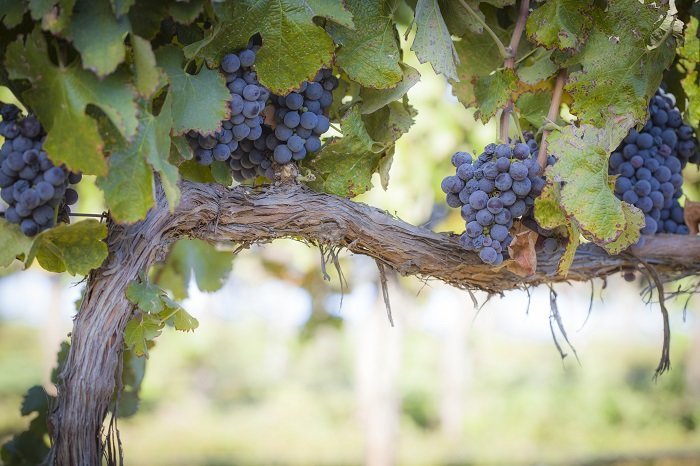The trip to the garden: John 15: 1-11
Come now, let us leave. With these words, Jesus calls his disciples to leave the upper room and go with him to the garden of Gethsemane, which is on the Mount of Olives. To get to the garden, Jesus and his disciples had to leave the southwest corner of the old city of Jerusalem and wind their way across the Tyropeon and Kidron Valleys and finally up to Gethsemane. This path would have taken them past the many vineyards that around the outskirts of Jerusalem in that time. In the bright light of the full Passover moon, the vineyards would have been quite visible. Jesus once again used what was at hand to illustrate the truth He wanted to instill into his followers, and as they walked past the vineyards, he began to teach on this most profound discourse on the vine and the branches.
“I am the true Vine and my Father is the gardener. He cuts off every branch of mine that doesn’t produce fruit and he prunes the branches that do bare fruit so they will produce even more”
John 15:1
The symbolism here is quite striking where Jesus describes himself as the grapevine, his followers, the church as the branches and God the father is the gardener, literally described as the “Earth worker.” Jesus begins to describes a vineyard with a gardener trimming the plants, cutting off all the dead and sucker shoots.
Within the church, there will appear from time to time, men and women who appear to be believers, but who never become fruitful branches. They seem to give evidence of life, just as Judas did when he did miracles in Jesus’s name along with the other disciples, but they never bared true fruit and they never will. It is the Father‘s task to remove them. We all can remember people whom we would hang-out with, who weren’t the best influence on us, maybe they put you in compromising even dangerous situations. I remember situations like these when l was in my teens outside the church, however as we see here, it also happens in the Church, but the Father will remove the false Christians from His Church.
“they went out from us, but they did not really belong to us. For if they had belonged to us, they would have remained with us, but they’re going showed that none of them belonged to us.”
1 John 2:19
Notice that the Father/Gardener not only prunes the unproductive branches off the vine, he also trims the productive branches so that they will be even more productive. Every branch that does bare fruit he trims so that they can be as fruitful as possible, the false believers will be cut out from among us. However, the true believers in the church will have to face the pain of being trimmed also, cleaned up, and cut back. We will be corrected. We will experience hurt and struggles. We will be tried and tested and refined. The dirt and cobwebs of sin that cling to us will be trimmed and cut away.
So, what does it mean to abide? We know the analogy only applies to believers, and that abiding produces something in the life of the believer, such that others can easily identify him or her as connected to Christ. But how does one abide in Christ? According to Jesus, the question is answered in one word: Obedience. Keeping the commandments and abiding in love are synonymous.
If you have trusted Christ, your eternal destiny has been set. Your chosen by God and nothing will pluck you from his hand. Your position in Christ is secure, however, your production is another matter. If you abide in Christ, that is, obeying and loving Him also loving others, you will enjoy 4 specific results:
(1) Prayers are answered. If we are connected to the vine, and we are becoming more and more like Jesus, our prayers will not be selfish, but the kind of request He would make. Jesus received everything He requested because He and the Father are completely and consistently aligned in their thinking.
(2) God is glorified. As we model the characteristics of Jesus, obeying his commands in the same way he obeyed those of the Father, the triune God receives all the credit. He delights to see us reflecting His character, and He looks for opportunities to pour out His blessings on his children in response.
(3) Love is stimulated. Note the absence of struggle or exertion. As we abide in Christ, the character qualities that honor the Lord begin to emerge like grapes, naturally growing from a healthy vine connected branch. Because God is love, others will notice this divine quality developing within us.
(4) Joy will overflow. Joy does not refer to supernatural happiness or shallow cheerfulness. Joy is a deeply felt contentment that transcends difficult circumstances and derives maximum enjoyment from every good experience. Although it is not all about laughter, abiding in Christ inspires laughter like you’ve never experienced before.
Jesus said abide in me and I in you, this word abides or remained is used no less than 10 times in the first 11 verses of this chapter. It implies a constant reminding or continuing in one spot or place, as a man dwelling always inside the walls of a fortified city.
Excerpts from:
- Ray Stedman, “God’s Loving Word: Exploring the Gospel of John”
- Chuck Swindoll, “Swindoll’s Living Insights New Testament Commentary: John”
- J. C. Ryle, “Expository Thoughts on the Gospels: John”

